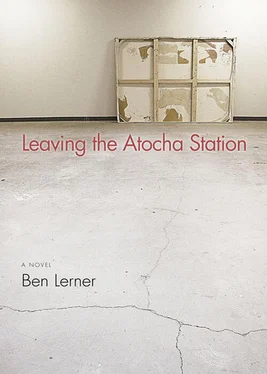We entered El Retiro through the main iron gates. It was the beginning of a long dusk and, as it was one of the first true spring evenings, people were out in force. There were young couples displaying their mutual absorption on nearly every bench, kids racing tricycles or playing tag or football, and the men who would soon be selling shaved ice were selling chipped potatoes. The voices and laughter and birds and wind and traffic combined and separated gently. As we made our way toward El Estanque, which would be full of pedal boaters, I felt that I could, in fact, imagine remaining in Spain indefinitely; I would live with and off of Teresa, my lover and translator, I would assemble a body of work, I would walk every evening through the park, I would master Spanish; a little wave of euphoria broke over me. But why was I imagining this with Teresa, not Isabel, given that I was in fact the lover of the latter, and had had no real romantic contact with the former? I had, however, so often kissed Teresa hello or good — bye, deliberately catching the corner of her mouth, or lingering near her face a second longer than necessary, that I felt we had a physical relationship, that we had been, if nothing else, in a stage of protracted courtship. But as we walked around El Estanque toward the colonnade, I was struck by the fear that this was only in my mind; Teresa must have noticed that I was catching her mouth, flirting, but surely that was not to be taken very seriously; after all, Teresa hadn’t taken it seriously when I told her about the death of my mother and wept down her elegant back. I had never attempted to initiate anything with Teresa, but this was in part because I always assumed I could, that she was, if not exactly waiting for my advances, open to them, and that keeping such a possibility alive was for both of us, at least for the moment, more exciting than any consummation. While I had never thought I was in love with Teresa, whatever that might mean, I had on more than one occasion thought that she was maybe a little in love with me. And if we never slept together or otherwise “realized” our relationship, I would leave Spain with this gorgeous possibility intact, and in my memory could always ponder the relationship I might have had in the flattering light of the subjunctive. I’d never formulated this notion before, but had felt it, and only now, half an hour after our conversation at the café, was I beginning to realize my mistake; she had assumed I was lying about my mother, a goofy, drunken foreigner wanting a hug; it hardly mattered to me that her assumption was true, but it mattered to me that it mattered so little to her. When we reached the colonnade, we sat on the cool steps not far from a circle of drummers and she began to roll a spliff. I looked at her and she was aureate in the failing light and humming something to go with the drums and the prospect of her not being at least a little in love with me was crushing.
I wanted to kiss her or say something dramatic in English, but I knew I would make myself ridiculous. Instead, as we finished smoking, I pretended to remember with a start:
“I have to meet someone,” I said, standing with a suddenness that declared the someone important.
“O.K.,” she said, her face registering no curiosity, let alone jealousy. I hoped against hope this was affectation. “Soon we should talk about the new translations,” she said. The gallery was going to print a small bilingual pamphlet of my poems.
“Claro,” I said, and kissed her twice quickly far from the mouth and walked hurriedly back the way we’d come. Without paying attention to where I was going, I retraced our steps and found myself, cold and sober, back in front of El Circulo de Bellas Artes. I bought a ticket for the next show, which I thought was Campanadas a medianoche. I sat in the same seat, Teresa’s absence beside me. I took a yellow pill and waited; I was half an hour early. I drifted off, but was awakened by the movie’s opening strains: it was the second showing of Citizen Kane.
__________________________
Isabel and I were smoking in bed in the early evening and she was reading Ana María Matute and I was reading Tolstoy’s The Kreutzer Sonata when I mentioned apropos of nothing that I would like to see Granada at some point and she said there was a night train that took about five hours so we packed what we could in the bags we always carried and walked to Atocha; I bought our tickets. We killed an hour drinking coffee in the atrium and then we boarded the archaic — looking Talgo train and found our seats and opened our respective books again, looking up at each other when with a jerk the train began to move.
Excepting subways, a few commuter trains, and the miniature train in a Topeka park, I had never traveled by rail, as archaic a method of conveyance, I thought to myself, as poetry; a few minutes later I offered this thought to Isabel. She laughed and leaned over and kissed me and I wished that Teresa could see us, dark fields sliding by. Isabel removed the silver sticks from her hair and leaned her head against my shoulder and drifted off while I flipped through the Tolstoy for a half — remembered passage about a train, but couldn’t find it. It didn’t matter; every sentence, regardless of its subject, became mimetic of the action of the train, and the train mimetic of the sentence, and I felt suddenly coeval with its syntax. Because the sentences of Tolstoy, or rather Constance Garnett’s translations of Tolstoy, were in perfect harmony with the motion of the Talgo, real time and the time of prose began to merge, and reading, instead of removing me from the world, intensified my experience of the present.
I put down the book and began to think: this strange experience of reading, the sense of harmony between the rhythms of a reproduction and the real, their structural identity, so that the subject of the sentence was precisely the time of its being furthered — this was what I valued in one of the only people I described as a “major poet” without irony, John Ashbery. I fished his Selected Poems from my bag, careful not to disturb Isabel, and opened it at random and read a little. Here also one could experience the texture of time as it passed, a shadow train, life’s white machine. Ashbery’s flowing sentences always felt as if they were making sense, but when you looked up from the page, it was impossible to say what sense had been made; while they used the language of logical connection—“but,” “therefore,” “so”—and the language that implied narrative development—“then,” “next,” “later”—such terms were merely propulsive; there was no actual organizing logic or progression. Reading an Ashbery sentence, an elaborate sentence stretched over many lines, one felt the arc and feel of thinking in the absence of thoughts. His pronouns—“it,” “you,” “we,” “I”—created a sense of intimacy, as though you were being addressed or doing the addressing or were familiar with the context the poem assumed, but you could never be sure of their antecedents, person or thing. The “it” in an Ashbery poem seemed ultimately to refer to the mysteries of the poem itself; in the absence of any stable external referent, the poem’s procedures invested its pronouns, and the “you” devolved upon the reader. I read:
As long as it is there
You will desire it as its tag of wall sinks
Deeper as though hollowed by sunlight that
Just fits over it; it is both mirage and the little
That was present, the miserable totality
Mustered at any given moment, like your eyes
And all they speak of, such as your hands, in lost
Accents beyond any dream of ever wanting them again.
Читать дальше












